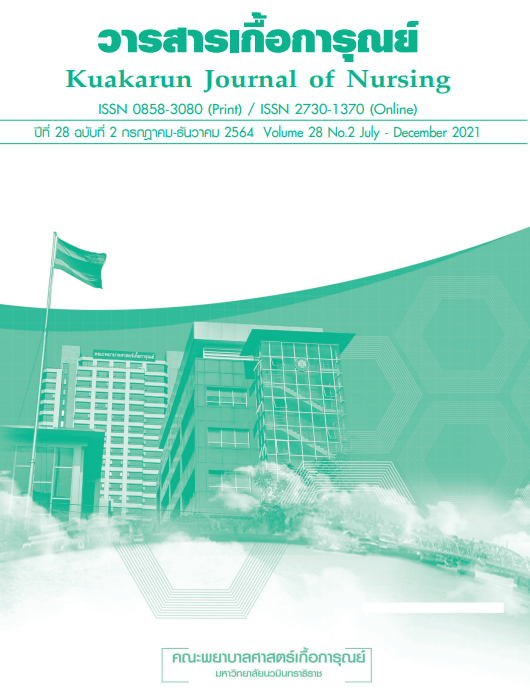ผลของโปรแกรมการสนับสนุนตามความต้องการของครอบครัวต่อความวิตกกังวลและความพึงพอใจของครอบครัวผู้ป่วยบาดเจ็บที่ศีรษะ แผนกอุบัติเหตุและฉุกเฉิน
คำสำคัญ:
โปรแกรมการสนับสนุนตามความต้องการของครอบครัว, ความวิตกกังวล, ความพึงพอใจ, สมาชิกครอบครัวของผู้ป่วยบาดเจ็บที่ศีรษะบทคัดย่อ
การวิจัยแบบกึ่งทดลองนี้ มีวัตถุประสงค์เพื่อศึกษาผลของโปรแกรมการสนับสนุนตามความต้องการของครอบครัวต่อความวิตกกังวล และความพึงพอใจของครอบครัวผู้ป่วยบาดเจ็บที่ศีรษะ แผนกอุบัติเหตุ และฉุกเฉิน ประยุกต์ใช้แนวคิดการตอบสนองความต้องการของครอบครัวผู้ป่วยวิกฤตของมอลเตอร์ กลุ่มตัวอย่าง คือ ครอบครัวผู้ป่วยบาดเจ็บที่ศีรษะเล็กน้อยถึงปานกลาง รับการรักษาที่โรงพยาบาล เวชการุณย์รัศมิ์ แบ่งกลุ่มทดลองและควบคุมกลุ่มละ 30 คน คัดเลือกแบบเจาะจง จับคู่เรื่องเพศของครอบครัวและความรุนแรงการบาดเจ็บที่ศีรษะของผู้ป่วย เครื่องมือที่ใช้ในการวิจัย 1) แบบประเมินข้อมูลส่วนบุคคล 2) แบบประเมินความวิตกกังวล 3) แบบประเมินความพึงพอใจ และ 4) แบบประเมินความต้องการ ค่าความเที่ยงเท่ากับ .93, .96 และ .93 ตามลำดับ เครื่องมือที่ใช้ในการทดลอง ได้แก่ โปรแกรมการสนับสนุนตามความต้องการของครอบครัวฯ วิเคราะห์ข้อมูลโดยใช้สถิติพรรณนาและสถิติที
ผลการวิจัย พบว่า คะแนนเฉลี่ยความพึงพอใจหลังได้รับโปรแกรมฯ สูงกว่าหลังได้รับการพยาบาลตามปกติแตกต่างกันอย่างมีนัยสำคัญทางสถิติที่ระดับ .05 ส่วนคะแนนเฉลี่ยความวิตกกังวลหลังได้รับโปรแกรมฯ ต่ำกว่าก่อนได้รับโปรแกรมฯ และหลังได้รับการพยาบาลตามปกติ แสดงให้เห็นว่าโปรแกรมฯ สามารถตอบสนองความต้องการของครอบครัว ก่อให้เกิดความพึงพอใจ และลดความวิตกกังวล เป็นแนวทางให้พยาบาลในการช่วยเหลือ และจัดบริการเพื่อตอบสนองความต้องการ
เอกสารอ้างอิง
Ministry of Public Health, Division of Non Communicable Diseases. Annual report 2018. Bangkok: Aksorn Grphic and Design; 2018. (in Thai)
Limumnoilap S. Critical care nursing. 8th ed. Khonkaen: Klungnana Vitthaya; 2013. (in Thai)
Lhaosupab N, Monkong S, Sirapo-ngam Y. Effect of stress management program for relatives of critically ill patients on relatives' stress. Ramathibodi Nursing Journal 2014;20(1):67-81. (in Thai)
McAdam JL, Dracup KA, White DB, Fontaine DK, Puntillo KA. Symptom experiences of family members of intensive care unit patients at high risk for dying. Critical Care Medicine 2010;38(4):1078-85.
Pochard F, Darmon M, Fassier T, Bollaert PE, Cheval C, Coloigner M, et al. Symptoms of anxiety and depression in family members of intensive care unit patients before discharge or death. A prospective multicenter study. Journal of Critical Care 2005;20(1):90-6.
Khiewchaum R. Effect of traumatic brain injury. Journal of Phrapokklao Nursing College 2016;27(1):103-11. (in Thai)
Buachai R. Needs and responses to needs as perceived by the family members of hospitalized traumatic brain injury patients [Dissertation]. Nakornpathom: Mahidol University; 2010. (in Thai)
Dangsuwan K, Phongsuwan C, Gaseng S, Srichai P, Jeankong B, Masae R, et al. Perceived information of relatives at emergency department, Naradhiwasrajanagarindra hospital. Princess of Naradhiwas University Journal 2012;4(2):16-28. (in Thai)
Sangsongrit N. Crisis in emergency department: caring for patient’s relatives with humanized care nursing. Thai Red Cross Nursing Journal 2017;10(2):47-56. (in Thai)
Srisupha-olarn I. The effect of meeting family-needs program on anxiety of family members of critically ill patients [Dissertation]. Bangkok: Chulalongkorn University; 2014. (in Thai)
Prasittikan N. The effects of clinical nursing practice guidelines for readiness preparation of caregivers in dealing with patient crisis on care givers’ needs response at the emergency department [Dissertation]. Nakornpathom: Mahidol University; 2010. (in Thai)
Chien WT, Chiu YL, Lam LW, Ip WY. Effects of a needs-based education programme for family carers with a relative in an intensive care unit: a quasi-experimental study. International Journal of Nursing Studies 2006;43(1):39-50.
Sawasdinaruenart S. Effects of information and emotional support program on caregivers stress and stress impacts in caring for patients with traumatic brain injury in critical phase [Dissertation]. Songkhla: Prince of Songkla University; 2012. (in Thai)
Sauls JL, Warise LF. Interventions for anxiety in the critically ill: a guide for nurses and families. Nursing Clinics of North America 2010;45(4):555-67.
Mitsungnern T, Kotruchin P, Phu-ngoen P, Tacha-a-tik P, Prasanson T, Sumritrin S, et al. Customers’ satisfaction and causes of satisfaction in emergency room Srinagarind hospital 2014. Srinagarind Medical Journal 2016;31(4):202-12. (in Thai)
Norouzinia R, Aghabarari M, Shiri M, Karimi M, Samami E. Communication barriers perceived by nurses and patients. Global Journal of Health Science 2015;8(6):65-74.
Panprasert S. Effects of informational and emotional support on the anxiety and satisfaction of accidental patients' relatives during the waiting period at the accident and emergency department [Dissertation]. Nakornpathom: Mahidol University; 2004. (in Thai)
Molter NC. Needs of relatives of critically ill patients: a descriptive study. Heart & Lungs 1979;8(2):332-9.
Thapinta D. Reduction of anxiety of staff nurses working with AIDS patient through cognitive reconstructuring and mindfulness training [Dissertation]. Bangkok: Chulalongkorn University; 1992. (in Thai)
Trakulboonnate N. The satisfaction of out-patient department service in the pricess mother Navuti hospital. Journal of the Police Nurses 2017;9(2):64-74. (in Thai)

















